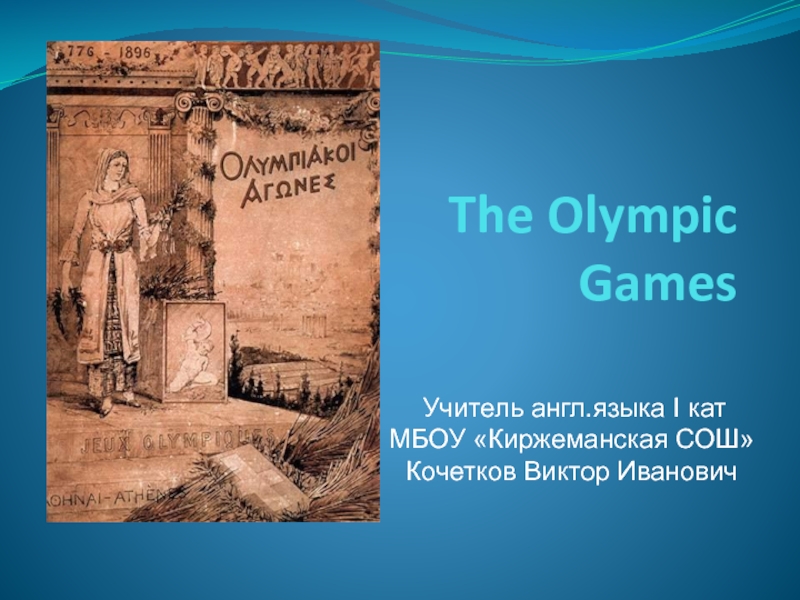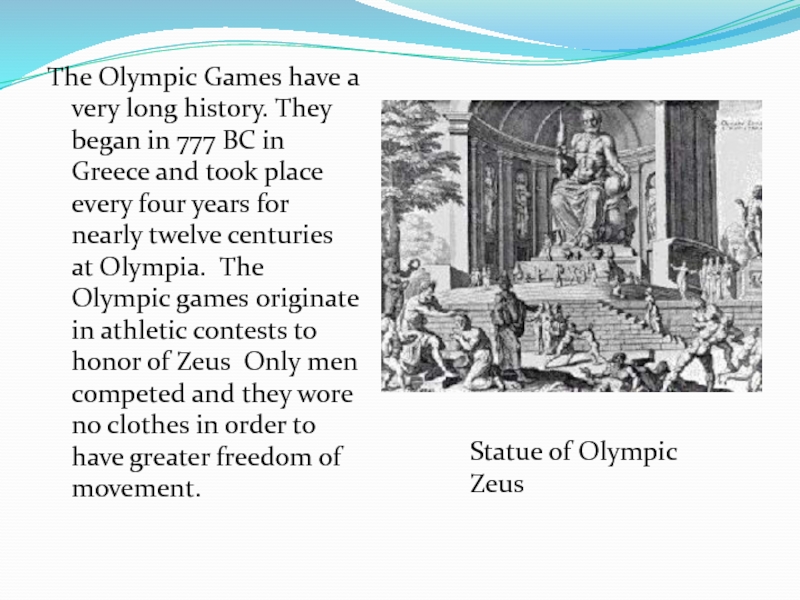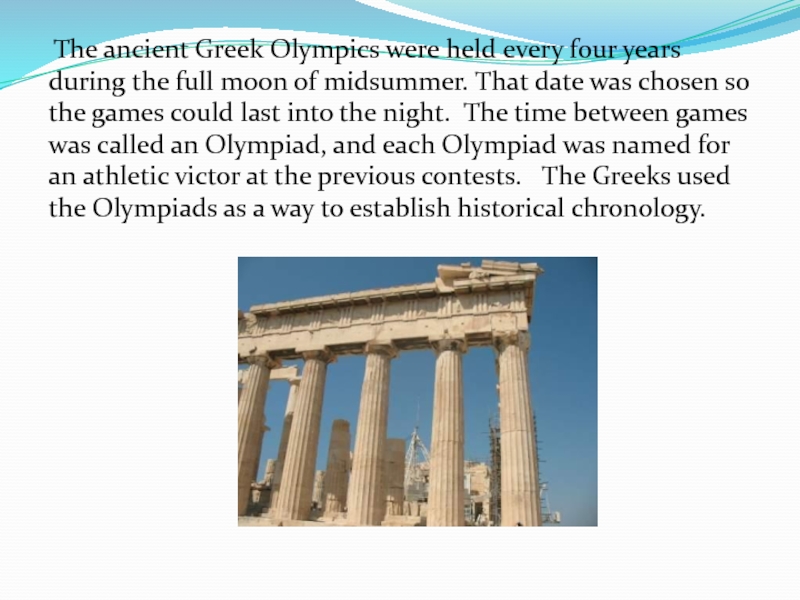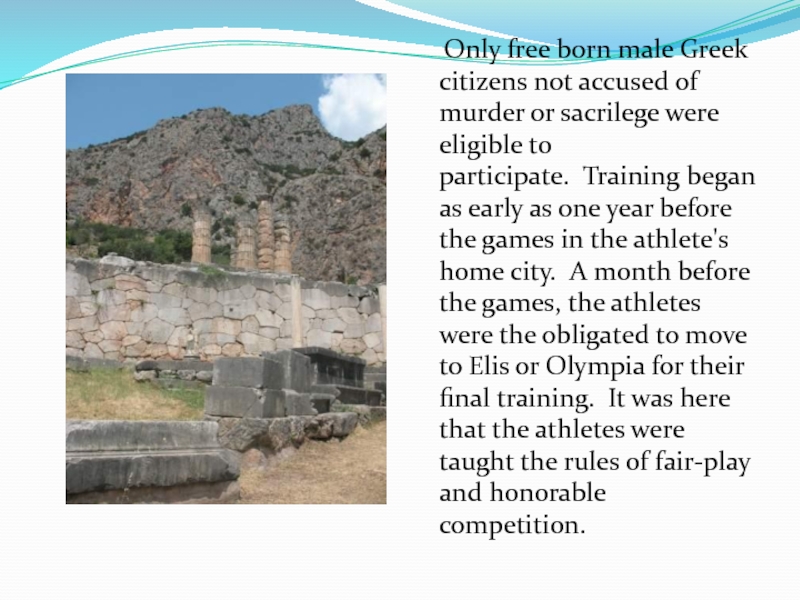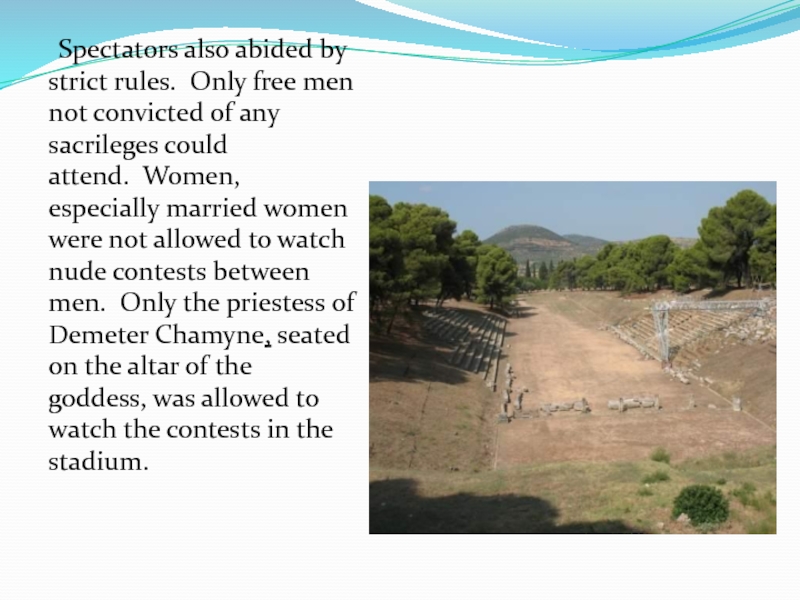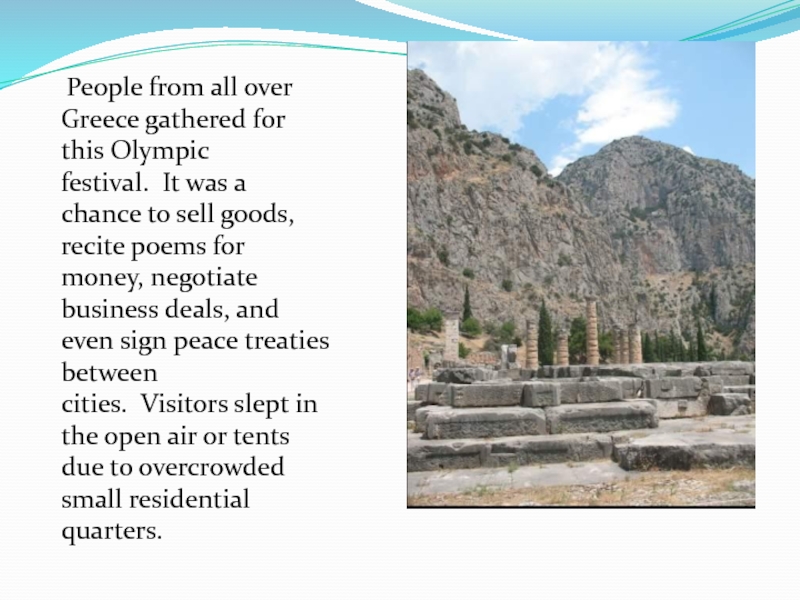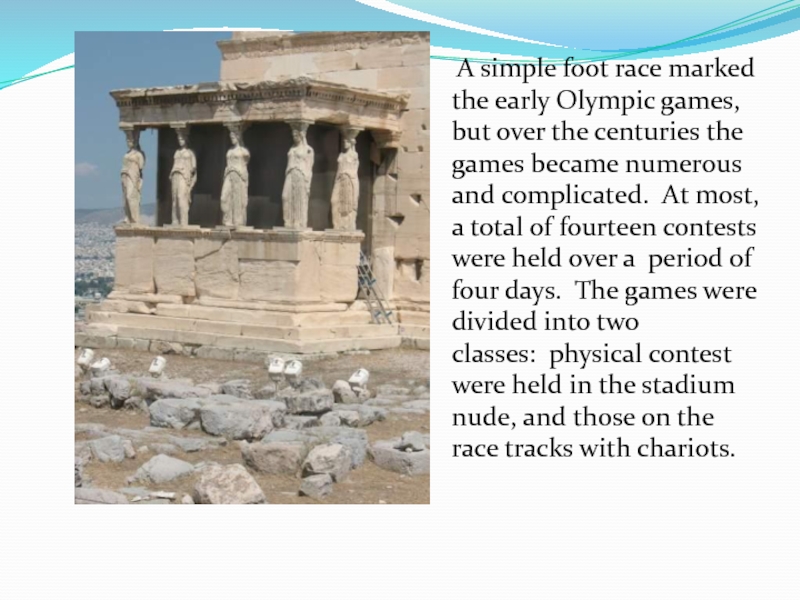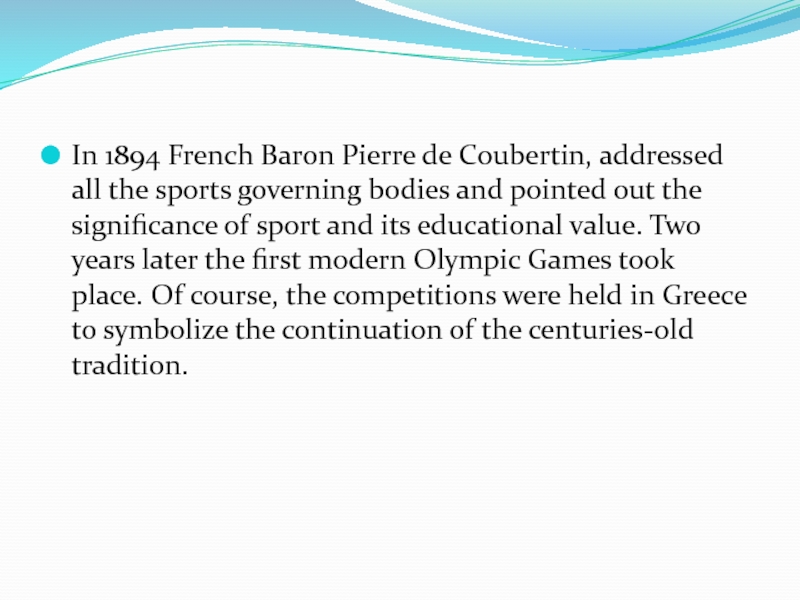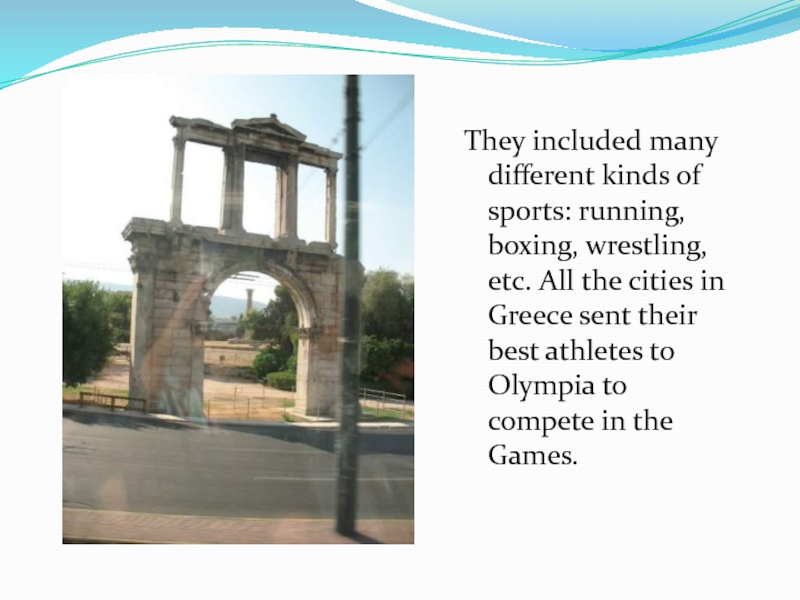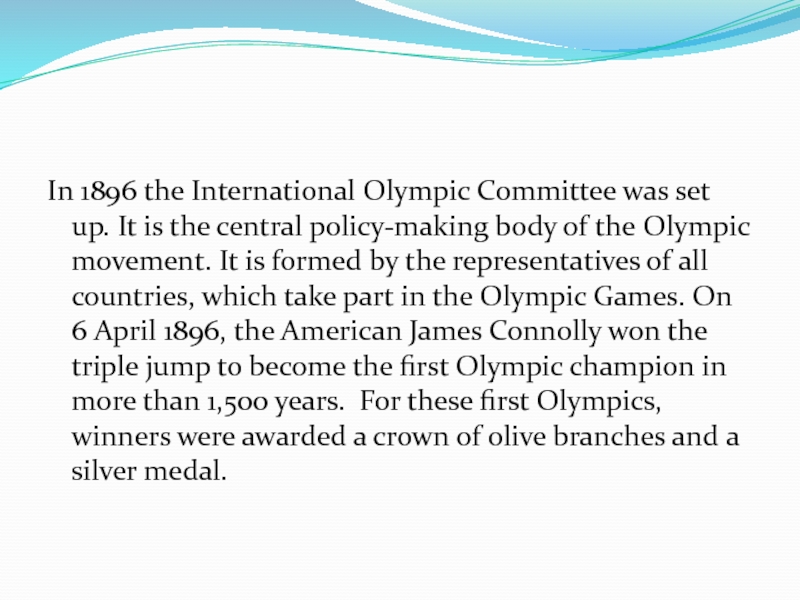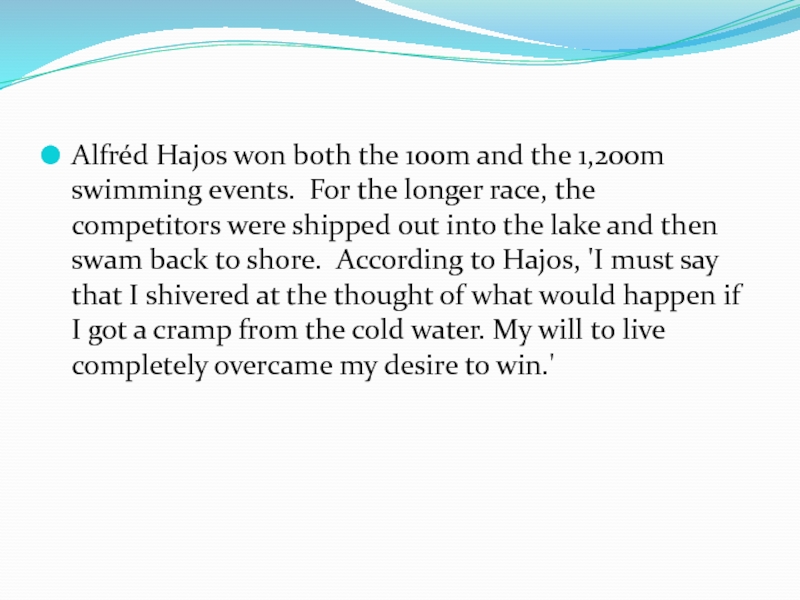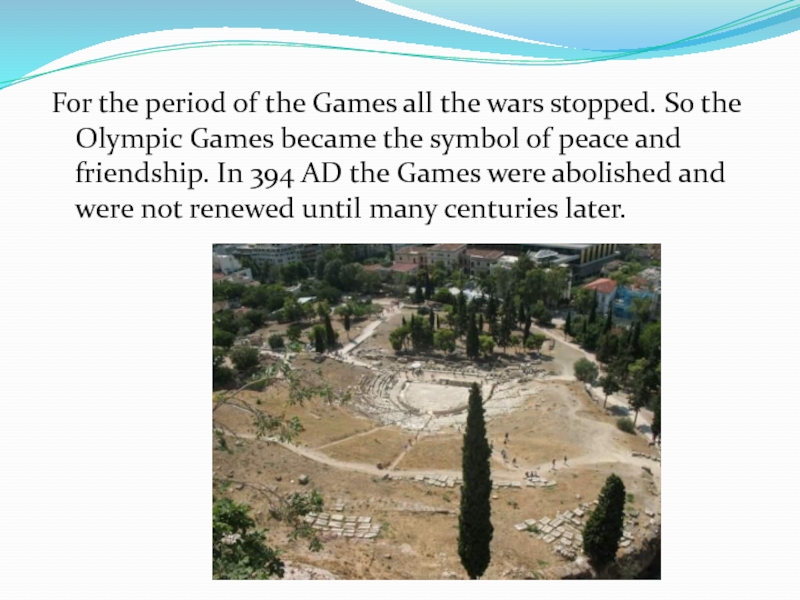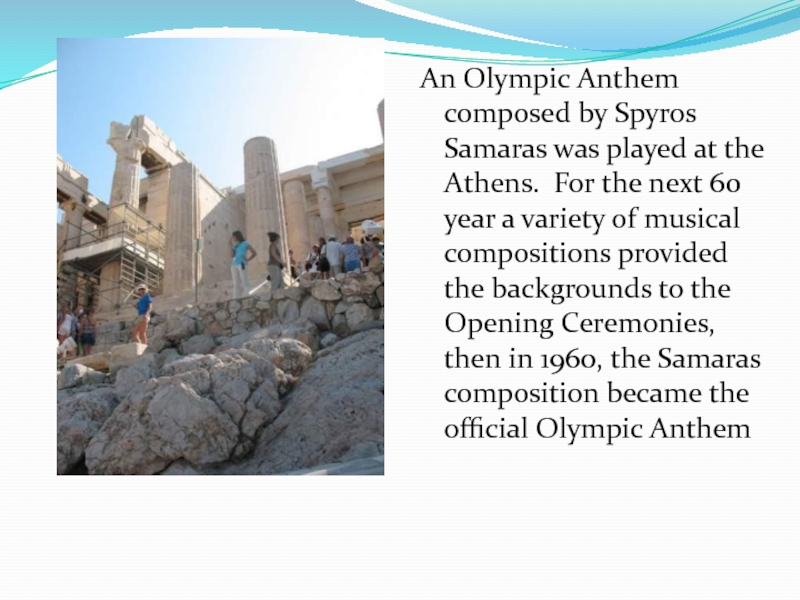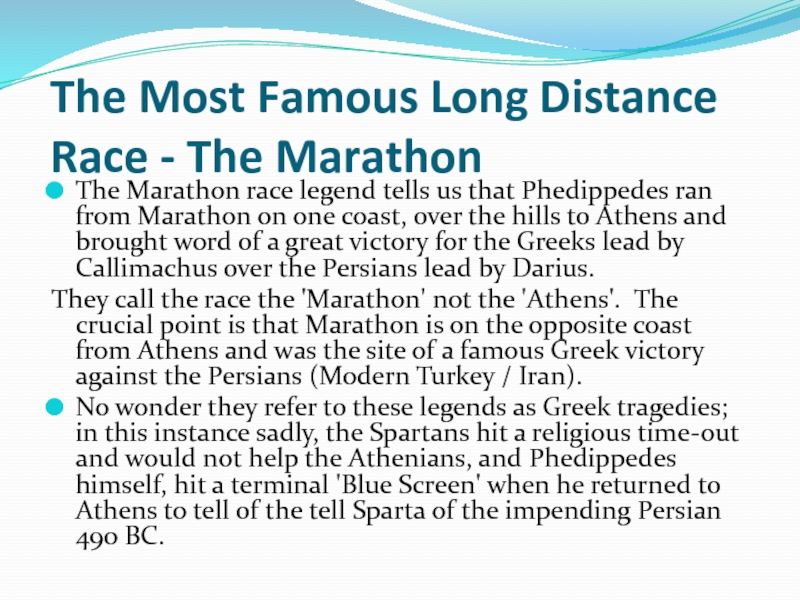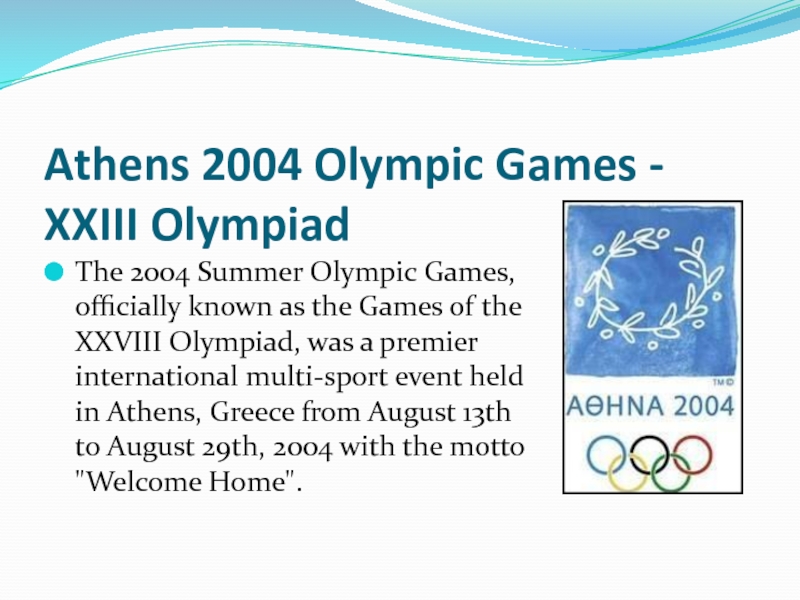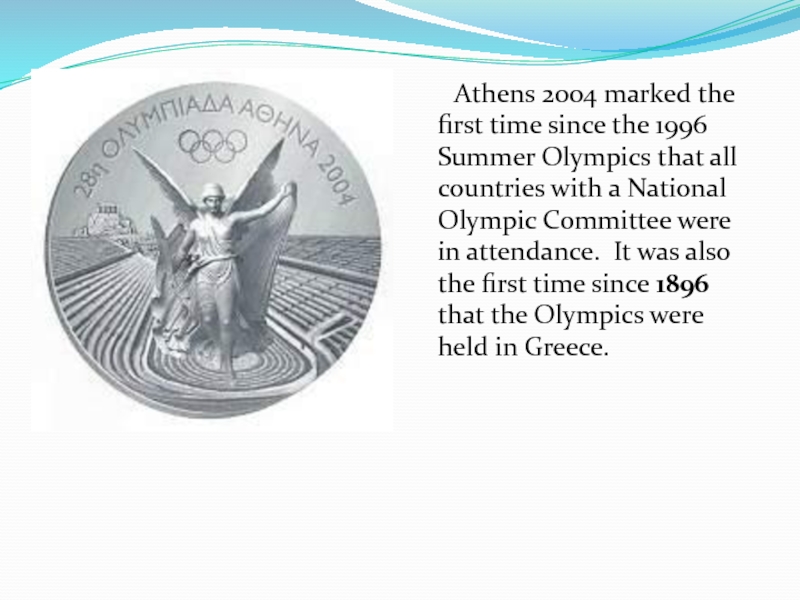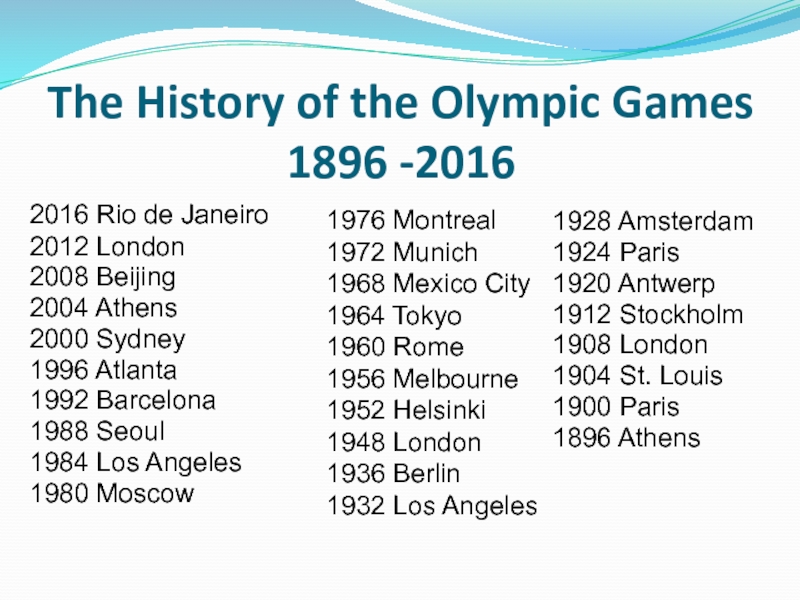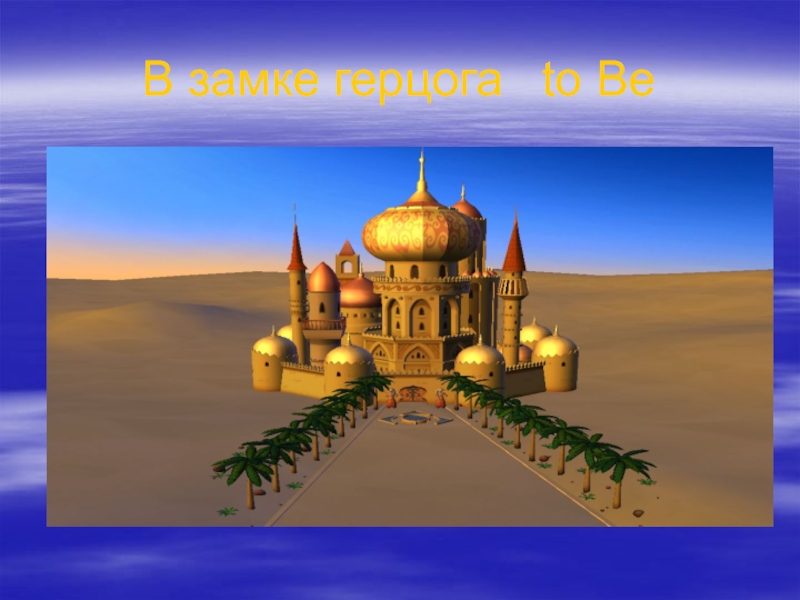Разделы презентаций
- Разное
- Английский язык
- Астрономия
- Алгебра
- Биология
- География
- Геометрия
- Детские презентации
- Информатика
- История
- Литература
- Математика
- Медицина
- Менеджмент
- Музыка
- МХК
- Немецкий язык
- ОБЖ
- Обществознание
- Окружающий мир
- Педагогика
- Русский язык
- Технология
- Физика
- Философия
- Химия
- Шаблоны, картинки для презентаций
- Экология
- Экономика
- Юриспруденция
The Olympic Games
Содержание
- 1. The Olympic Games
- 2. The Olympic Games have a very long
- 3. The ancient Greek Olympics were held every
- 4. Only free born male Greek citizens not
- 5. Spectators also abided by strict rules. Only free
- 6. People from all over Greece gathered for
- 7. A simple foot race marked the early
- 8. In 1894 French Baron Pierre de Coubertin,
- 9. They included many different kinds of sports:
- 10. In 1896 the International Olympic Committee was
- 11. Alfréd Hajos won both the 100m and
- 12. For the period of the Games all
- 13. An Olympic Anthem composed by Spyros Samaras
- 14. The Most
- 15. Athens 2004 Olympic Games -
- 16. Athens 2004 marked the first time since
- 17. New Stadium in Athens
- 18. Слайд 18
- 19. Скачать презентанцию
The Olympic Games have a very long history. They began in 777 ВС in Greece and took place every four years for nearly twelve centuries at Olympia. The Olympic games originate
Слайды и текст этой презентации
Слайд 2The Olympic Games have a very long history. They began
in 777 ВС in Greece and took place every four
years for nearly twelve centuries at Olympia. The Olympic games originate in athletic contests to honor of Zeus Only men competed and they wore no clothes in order to have greater freedom of movement.Statue of Olympic Zeus
Слайд 3 The ancient Greek Olympics were held every four years during
the full moon of midsummer. That date was chosen so the games
could last into the night. The time between games was called an Olympiad, and each Olympiad was named for an athletic victor at the previous contests. The Greeks used the Olympiads as a way to establish historical chronology.Слайд 4 Only free born male Greek citizens not accused of murder
or sacrilege were eligible to participate. Training began as early as
one year before the games in the athlete's home city. A month before the games, the athletes were the obligated to move to Elis or Olympia for their final training. It was here that the athletes were taught the rules of fair-play and honorable competition.Слайд 5 Spectators also abided by strict rules. Only free men not convicted
of any sacrileges could attend. Women, especially married women were not
allowed to watch nude contests between men. Only the priestess of Demeter Chamyne, seated on the altar of the goddess, was allowed to watch the contests in the stadium.Слайд 6 People from all over Greece gathered for this Olympic festival. It
was a chance to sell goods, recite poems for money,
negotiate business deals, and even sign peace treaties between cities. Visitors slept in the open air or tents due to overcrowded small residential quarters.Слайд 7 A simple foot race marked the early Olympic games, but
over the centuries the games became numerous and complicated. At most,
a total of fourteen contests were held over a period of four days. The games were divided into two classes: physical contest were held in the stadium nude, and those on the race tracks with chariots.Слайд 8In 1894 French Baron Pierre de Coubertin, addressed all the
sports governing bodies and pointed out the significance of sport
and its educational value. Two years later the first modern Olympic Games took place. Of course, the competitions were held in Greece to symbolize the continuation of the centuries-old tradition.Слайд 9They included many different kinds of sports: running, boxing, wrestling,
etc. All the cities in Greece sent their best athletes
to Olympia to compete in the Games.Слайд 10In 1896 the International Olympic Committee was set up. It
is the central policy-making body of the Olympic movement. It
is formed by the representatives of all countries, which take part in the Olympic Games. On 6 April 1896, the American James Connolly won the triple jump to become the first Olympic champion in more than 1,500 years. For these first Olympics, winners were awarded a crown of olive branches and a silver medal.Слайд 11Alfréd Hajos won both the 100m and the 1,200m swimming
events. For the longer race, the competitors were shipped out
into the lake and then swam back to shore. According to Hajos, 'I must say that I shivered at the thought of what would happen if I got a cramp from the cold water. My will to live completely overcame my desire to win.'Слайд 12For the period of the Games all the wars stopped.
So the Olympic Games became the symbol of peace and
friendship. In 394 AD the Games were abolished and were not renewed until many centuries later.Слайд 13An Olympic Anthem composed by Spyros Samaras was played at
the Athens. For the next 60 year a variety of
musical compositions provided the backgrounds to the Opening Ceremonies, then in 1960, the Samaras composition became the official Olympic AnthemСлайд 14
The Most Famous Long Distance Race - The Marathon
The Marathon
race legend tells us that Phedippedes ran from Marathon on
one coast, over the hills to Athens and brought word of a great victory for the Greeks lead by Callimachus over the Persians lead by Darius.They call the race the 'Marathon' not the 'Athens'. The crucial point is that Marathon is on the opposite coast from Athens and was the site of a famous Greek victory against the Persians (Modern Turkey / Iran).
No wonder they refer to these legends as Greek tragedies; in this instance sadly, the Spartans hit a religious time-out and would not help the Athenians, and Phedippedes himself, hit a terminal 'Blue Screen' when he returned to Athens to tell of the tell Sparta of the impending Persian 490 BC.
Слайд 15
Athens 2004 Olympic Games - XXIII Olympiad
The 2004 Summer Olympic
Games, officially known as the Games of the XXVIII Olympiad,
was a premier international multi-sport event held in Athens, Greece from August 13th to August 29th, 2004 with the motto "Welcome Home".Слайд 16 Athens 2004 marked the first time since the 1996 Summer
Olympics that all countries with a National Olympic Committee were
in attendance. It was also the first time since 1896 that the Olympics were held in Greece.Слайд 18
The History of the Olympic Games 1896 -2016
2016 Rio de
Janeiro
2012 London
2008 Beijing
2004 Athens
2000 Sydney
1996 Atlanta
1992 Barcelona
1988 Seoul
1984 Los Angeles
1980
Moscow1928 Amsterdam
1924 Paris
1920 Antwerp
1912 Stockholm
1908 London
1904 St. Louis
1900 Paris
1896 Athens
1976 Montreal
1972 Munich
1968 Mexico City
1964 Tokyo
1960 Rome
1956 Melbourne
1952 Helsinki
1948 London
1936 Berlin
1932 Los Angeles
